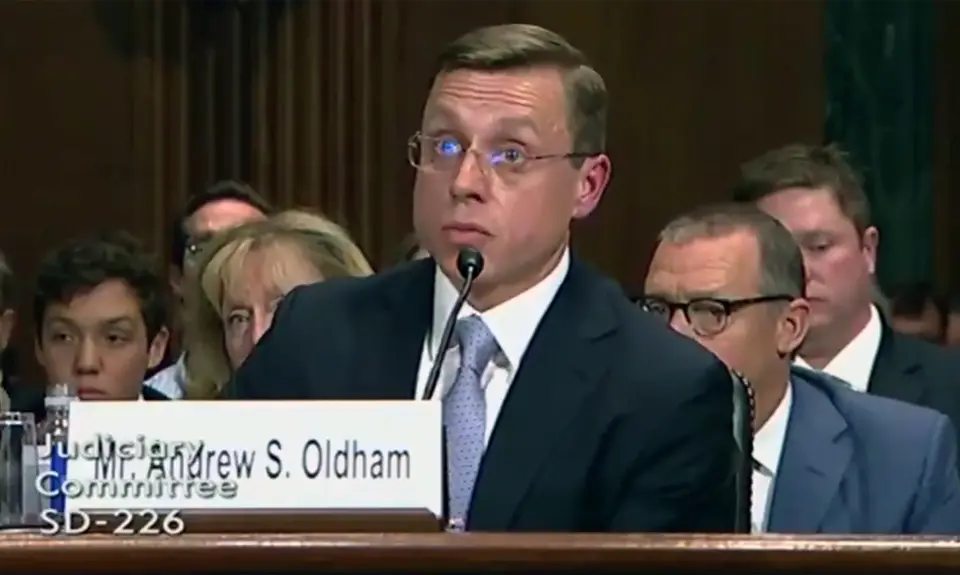“Confirmed Judges, Confirmed Fears” is a blog series documenting the harmful impact of President Trump’s judges on Americans’ rights and liberties. Cases in the series can be found by issue and by judge at this link.
Trump Fifth Circuit judge Andrew Oldham argued that the court should reverse a district judge and uphold an investigative stop of a Black man based on nothing more than an anonymous tip. In an opinion by a judge nominated by President Reagan, a Fifth Circuit panel rejected Oldham’s view and upheld the district court’s decision to suppress evidence obtained as a result of the improper stop in its March 2021 decision in US v Norbert.
One morning, the Hinds County Sherriff’s office received an anonymous telephone tip that drug dealing was occurring in a parking lot of an apartment complex in Jackson, Mississippi. The caller, who would not identify herself but claimed she worked at the apartments, stated that she thought the dealer was a black male known as “N.O.” who drove a black Infiniti.
At least eight hours later, around 8 pm, police went to the parking lot to investigate. They saw several black men there, one of whom was Okanlawan Norbert, who confirmed ownership of a black Infiniti parked 15-20 feet away. There was no reasonable suspicion of illegal activity at the time, and when police conducted a pat down search of the men “for officer safety,” they found “no evidence” on Norbert. Police nonetheless continued the investigative stop and questioning of Norbert, walked over to his car and saw a handgun inside, determined that Norbert had a felony conviction, opened a car door and took the gun, and charged Norbert with illegally possessing a gun. No charges concerning drugs were ever brought.
Norbert filed a motion to suppress, contending that the handgun was discovered only as a result of an improper investigative stop and seizure of him with no reasonable suspicion of illegal activity. The district court agreed, but the government appealed.
In a 2-1 decision by Reagan nominee Judge W Eugene Davis, a Fifth Circuit panel affirmed the district court ruling. Davis quoted the Supreme court as expressing a “strong distrust of anonymous tips” and as stating that such tips are “insufficient to justify an investigative stop” in most cases, as opposed to tips from known informants. The majority went on to analyze the specific factors in Fifth Circuit cases on the issue of whether such tips can provide the necessary “reasonable suspicion that criminal activity has taken or is currently taking place.” Based on the district court’s finding that the tip “lacked credibility and reliability” and the “police’s failure to corroborate illegal” drug sales or use as claimed by the tipster, the majority concluded that the tip did not provide reasonable suspicion for the police’s action.
Trump judge Oldham dissented. He disagreed with the district judge’s factual findings that the tipster lacked “credibility and reliability,” and argued that the majority should have followed two Supreme Court decisions in which anonymous tips were found sufficient to support reasonable suspicion. Oldham was extremely critical of the majority’s decision, asserting that it was trying to turn the Fourth Amendment into a “license to promulgate” its own “Wishlist of Best Police Practices.”
Judge Davis showed what was wrong with Oldham’s claims. He explained that the “main problem” with the dissent was its “refusal to recognize the standard of review we must apply in this case,” under which the district judge’s findings must be accepted “if there is any reasonable view of the evidence to support it,” which there clearly was. The cases cited by Oldham did not apply, the majority went on, since the caller in one provided “verifiable information” about the suspect’s “future illegal activity,’ while the other concerned a “911 emergency call” in which immediate action was needed. But in this case, the majority continued, the police investigated “some eight hours” after the call with “ample opportunity” for the police to “verify the anonymous tip.”
The majority thus affirmed the district court ruling and made clear that the police decision to stop and seize Norbert was improper. The case is yet another example of Trump judges like Oldham seeking to provide wide discretion to police to take action against black men with no proper legal basis.
